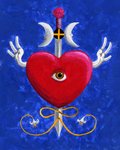- "Yoruba legends" redirects here. For the book, see Yoruba Legends.
The mythology of the Yoruba is the entire gamut of the world view and the religions of the Yoruba both in Africa (chiefly in Nigeria and Benin Republic), and in the New World, where it has influenced or given birth to several religions such as Santería in Cuba and Candomblé in Brazil in addition to the transplantation of the homeland religions.
Yoruba mythology is only one part of itan — the complex of myths, songs, histories and other cultural concepts which make up the Yorùbá religion and society.
Deities

Yòrùbá deities are called Orishas, literally "owners of heads". Shango is perhaps the most important Orisha; god of thunder and an ancestor of the Yòrùbá. He was the fourth king of the Yòrùbá, and deified after his death.
Èshù|Eshu is another very important Orisha. He is a trickster and very well-respected both by the Yòrùbá themselves and the other Orishas.
The Orisha
Other concepts
Yòrùbá mythology includes several other entities besides the Orisha, such as Egbére.
Ifá dafa as well as merindinlogun or (cowrie shell divination) are important element of Yòrùbá religious practices.
- Eledua
Reincarnation
The Yoruba believe in reincarnation. They sometimes name children Babatunde ("Father returns") and Yetunde ("Mother returns") to signal this belief.[1]
Yoruba mythology in the New World
Many ethnic Yoruba were taken as slaves to Cuba, the Dominican Republic, Puerto Rico, Brazil, Venezuela and the rest of the New World (chiefly in the 19th century, after the Ọyọ empire collapsed and the region plunged into civil war), and carried their religious beliefs with them. These concepts were combined with preexisting African-based cults, Christianity, Native American mythology, and Kardecist Spiritism into various New World lineages:
The popularly known Vodun religion of Haiti was founded by slaves from a different ethnic group (the Gba speaking peoples of modern day Benin, Togo and Ghana), but shares many elements with the Yoruba-derived religions above. in addition, author Ed Morales has claimed that Yoruba mythology played a part in early American blues music, citing blues guitarist Robert Johnson's Cross Road Blues as a "thinly veiled reference to Eleggua, the orisha in charge of the crossroads."
See also
Category:Yorubans
Notes
- ^ Murphy, Joseph. Santería. Malaysia: Beacon Press, 1993.
References
- Morales, Ed (2003). The Latin Beat. Da Capo Press. ISBN 0-306-81018-2., pg. 277
External links
Religions: Candomblé • Hoodoo • Kumina • Obeah • Palo • Quimbanda • Santería (Lukumí) • Spiritual Baptist • Umbanda • Vodou
Deities: Babalu Aye • Eshu • Iansan • Obàtálá • Ogoun • Ọlọrun • Orunmila • Ọṣun • Shango • Yemaja
Roots: Ifá, Oriṣa (Yorùbá) • Lwa (Dahomey) • Nkisi (Kongo) • Catholicism (Spain, Portugal)








No comments:
Post a Comment